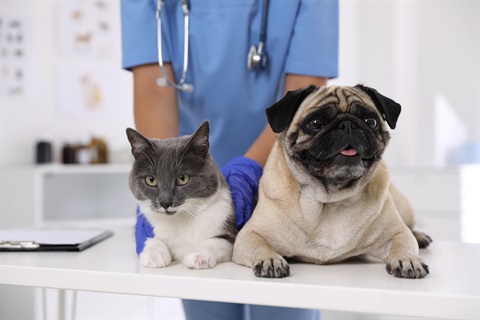Getting your pet desexed

When you need to desex your pet
Book your puppy in for desexing by the time they are 6 months old and kittens before they are 4 months old. After your pet is desexed you’ll receive a desexing certificate. This will entitle you to a discount on pet registration, provided your cat is desexed by 4 months and your dog is desexed by 6 months of age.
Visit your local vet to book desexing
Desexing can be done by your local vet, the RSPCA or the Cat Protection Society. We do not currently offer desexing services at BARC.
Desexing can be carried out safely on dogs and cats from the age of 12 weeks, although some vets prefer to wait until the animal is around 5 to 6 months old.
Cats and dogs risk major health problems, including cancer or haemorrhaging, if they fall pregnant later in life so it's important to desex your pet as soon as possible.
Discounted desexing
- If you are struggling to meet desexing costs, contact the RSPCA on 02 9770 7555 or the Cat Protection Society on 02 9519 7201. Both organisations offer pet desexing, microchipping and initial vaccinations at a discounted rate to owners in genuine need.
- All concession card holders are eligible for discounted desexing through the National Desexing Network. Call 1300 368 992 or visit their website www.ndn.org.au
Other costs
- Owners of cats not desexed by 4 months of age will be required to pay an annual permit in addition to their one-off lifetime pet registration fee.
- Owner of dogs that are not desexed by 6 months of age are not entitled to a discount on pet registration and will be required to pay the undesexed animal registration fee.
Australia already has too many unwanted animals, and hundreds of thousands of animals are put down each year.
Many unwanted litters are born because owners don’t get around to desexing their pet in time.
Cats can become pregnant at just 4 months old, and dogs can become pregnant at 5 months.
If a cat continues to have litters (at 4 to 6 kittens per litter), and her offspring breeds for 7 years, this can add 420,000 new cats to the population.
Desexed pets live longer and healthier lives, and are less prone to wander, fight and be anti-social.
It also costs less to register your pet if it is desexed.
Costs of not desexing your pet
If your undesexed female pet falls pregnant, you’ll need to find a new home for each puppy or kitten.
Dogs can have 10 or more puppies per litter, so finding homes for a whole litter can mean a lot of work for you.
Whether you sell or give them away, legally they have to be microchipped before they are old enough to go to their new home (at about 8 weeks old). Microchipping and vaccination will cost about $200 for each pup/kitten, plus they’ll need worm tablets, flea treatments and food (once they’ve been weaned) until they are adopted.
If your male pet fathers a litter, you may be expected to help find new homes for the puppies or kittens and pay half the expenses. It is illegal to dump pets, and especially cruel to leave a litter of vulnerable puppies or kittens to fend for themselves. Dumping animals carries heavy penalties in NSW.